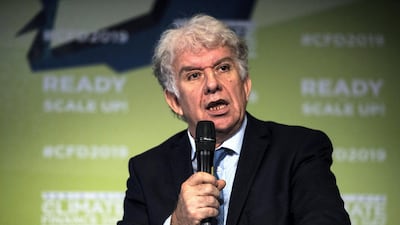Amundi, Europe’s biggest asset manager, plans to use its capital prudently as it looks to cash in on buying opportunities emerging out of the Covid-19 pandemic, its chief executive said.
The Paris asset manager, which has more than €1.53 trillion (Dh6.34tn) of assets under management, intends to invest in property, private debt and private equity funds, Yves Perrier told a Bloomberg web event on Wednesday.
“We are very [much] present in what you call real assets – real estate, private debt and some private equity funds – [and] we manage some €50 billion in real assets,” he said.
“We consider, in the present situation, [that] these assets are a good way of investing."
The money manager, which invests funds on behalf of institutional and individual investors, continues to promote its property fund that offers a yield of about 4 per cent, which Mr Perrier said is “good” under the current circumstances.
Amundi, he said, is also launching private equity and debt funds to replace corporate and small and medium-sized enterprise debt guaranteed by states, with equity or mezzanine financing replacing state guarantees that were put in place to help businesses as they expire.
This offers a way of reinforcing the capital structure of companies, he said.
“Being aggressive [in investments] is not the good qualification according to the [requirement of the] present times. I would say the global qualification[s] for our investment policies are prudence and selectivity.”
Asset managers across the world are searching for investment opportunities in after the Covid-19 pandemic ends.
The virus had infected more than 9.2 million people worldwide and killed more than 477,000 as of Wednesday, according to Johns Hopkins University, which is tracking the outbreak.
The global economy is set to slip into its deepest recession since the Second World War, after the virus forced governments to close borders and shut all but essential businesses.
Earlier this month, the Organisation for Economic Cooperation and Development said global output is projected to contract by 7.6 per cent this year.
The World Bank expects global output to shrink by 5.2 per cent.
The sudden collapse of the global economy caused equities across the world to fall, wiping out more than $20 trillion (Dh73.4tn) from their value.
The S&P 500 index and Dow Jones Industrial Average in the US ended their longest bull run and slumped into bear territory in March.
Global equities have since recovered, but have prompted investors to look for buying opportunities elsewhere.
Mr Perrier said Amundi is keeping its powder dry and cash in hand to use when an opportunity arises.
“At the beginning of the crisis I passed the simple message: we have three main objectives … liquidity, liquidity, and liquidity,” he said.
“We have [actually] increased liquidity, which is now 10 per cent and for some funds, 30 per cent of the total amount of the fund.”


